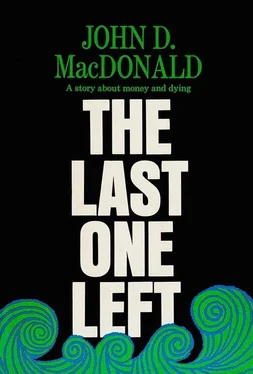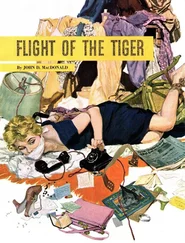At quarter to seven on Monday morning, Sam Boylston tapped at the door of Apartment 6, Harbour Heights Apartments. In a few moments the door opened as far as the safety chain would permit, and the girl in white looked at him through the gap.
“Sam Boylston,” he said. “I know I’m a little early. If it’s inconvenient I can come back...”
She closed the door, released the chain and let him into the small, bright, tidy living room. “Yes, you are early, Mr. Boylston, but perhaps it is better. I might not do this thing you want. Would you have some coffee with me?”
In her speech she had the Bahamian trait of emphasizing the unexpected word. Her face was too narrow for beauty, black bright eyes set too closely, her skin dusky sallow in the way of the mixed blood of the Islands. But she had freshness and style. Special Nurse Theyma Chappie was assigned to the daytime trick, eight in the morning to four in the afternoon, caring for Captain Garry Staniker in his private room at the Princess Margaret Hospital.
She brought his coffee to the table by the windows where she had been eating her breakfast, and they sat facing each other.
“I understand, Nurse. There’s no way I can force you.”
“It is what I said to my brother. Sir Willis has been very good to him, very helpful. If he had not been, perhaps I could not have had my training. But I am a professional person. There is an obligation to the patient. Also to the hospital. And there could be trouble with the officials too. To take a risk, I told my brother, I would have to believe it is a good thing to do, perhaps a necessary thing. We have been ordered to say nothing to reporters. Perhaps this is lies. A trick.”
He took out his wallet, unsnapped the packet of identifications and handed it to her. “I am exactly what I say I am, Nurse, a lawyer from Harlingen, Texas.” After she had looked at the identifications, as she handed them back, he handed her the color snapshot of Leila he took from another compartment of the wallet. “This is my kid sister. She was a guest aboard the Muñeca.”
“So pretty!” she said, and in a little while handed it back to him. “But they will question this captain carefully, no? What is the need of what you wish me to do?”
“There is one reason I cannot explain either to you or to the authorities, a reason to believe that Staniker may have — with or without help — killed those six people aboard and sunk the cruiser.”
She looked shocked. “But he does not seem such a person!”
“I want to know how he responds to questioning. I will be looking for things they will not be looking for. I think they are worried about carelessness. I am worried about guilt.”
“Then why not tell them your reasons, Mr. Boylston?”
“Because then, from their questions, he will know they know that reason. And he will be much more careful in his answers. It is a standard interrogation procedure, Nurse. If you pick up a murderer and charge him with a small robbery that happened on the same night, you will learn more than if you charge him with murder.”
“If I help you will it become — evidence in a court so it will come out how I helped you?”
“No. Maybe it was an accident. Maybe the boat blew up. If I learn anything that makes it seem otherwise, I’ll have to get him in some other way.”
She studied him. “He is like a thing to you. Something to hunt.”
“Do you think people should get away with mass murder?”
“Of course not. But if you want — too badly to believe he is guilty of something, maybe you will believe what you want to believe.”
“I’m not like that.”
She tilted her head. “... No. Perhaps not.” She took a quick look at the gold watch pinned to the bodice of her uniform. “I guess you must show me now how the machine works.”
“You’ll do it then.”
“But if it is found, I will have no idea how it came to be there.”
She marveled at how small the recorder was. She caught on very quickly as he explained the operation. She said that there was a deep shelf in the bedside stand, and she could place it on the back of that shelf behind a stack of fresh face towels, a place where she could easily turn it on or off.
When he asked her opinion of Staniker’s condition, she said, “He is a very strong one. He went a long time without help. For many persons, it might have been too long. There could be bad luck, perhaps more kidney damage than Dr. McGregory thinks. Or a pneumonia which will not respond to antibiotics, or a pulmonary edema we cannot control. He seemed dazed. And the tongue is very bruised and lacerated from the convulsions. He speaks with difficulty. Maybe the Doctor will permit an interrogation today. I would guess tomorrow. It will depend on his condition, of course.”
She fitted the recorder into her white shoulder bag, patted it. “I am glad it is such a small thing. And works so silently.” She looked amused and said, “Perhaps I can borrow it one day and find out if Helena entertains someone I know here when I am on a night shift and she is working days.” She flushed and said, “We share this place. There were three, but that is too many. The other went to an out island clinic. Now we must go, or I shall be late.”
Down on the street level, he watched her trundle her pale blue motor scooter out to the curb, kick down upon the starter lever and move away into morning traffic, her slender back very straight.
He had a professional uneasiness about the little electronic ear she carried with her. It was an eavesdropper with total recall. The slow considerations of the law have not kept pace with the technology, and so the explosive expansion of listening devices and techniques exists in a gray area. Inevitably, when the law lags too far behind the realities, an eventual permissiveness is achieved through the mere weight of investment, employment and universal use. The average citizen, when he thought of it at all, saw nothing wrong in the good guys bugging the homes and offices and phones of the bad guys. But history had the queasy trick of constantly reversing the roles. Had the redcoats been able to bug G. Washington’s winter encampment, he could have been fatally surprised on the shores of the Delaware.
The clever and compact little microphones and transmitters could spy on all sounds. The polygraph could, in a sense, spy upon the mind itself. And there was a dreadful inevitability about that day in the future when the state of the art obsoleted the business of affixing the sensors to the subject, the day when polygraphs could be taken without the knowledge of the subject. This would be the final and deadly invasion of all privacy.
He could recall the precise incidents which had led to his feeling of uneasiness. He had consented to handle a divorce action for an old friend. It was an area of the law he found distasteful. The old friend showed up with the specialist he had employed. The specialist had traced the wife to the particular motel where she would go with her lover. He had then installed equipment in a particular room and arranged that the couple be given that room. With obvious professional satisfaction, the specialist, in Sam Boylston’s darkened office, had projected his infra-red 8-mm movie film, taken by a camera mounted inside a ventilator grill, and had concurrently played a tape captured by a mike and transmitter affixed to the underside of the motel bed. He heard the voice of the woman whose parties he and Lyd had attended, saying in a moaning and gritty voice, “Now! Now! O God! O beautiful! O beautiful!”
When the film ended, the expert had turned off the tape and opened the blinds. As he rewound tape and film onto the reels, the only sound in the office had been the muffled hacking sobs of his friend sitting there with his face in his hands. Sam had told him to find another attorney, one who would be willing to use this inadmissible evidence as a club to beat down any demand the wife might make for support. The expert was not angry or upset. Merely very very puzzled. Without such brutal and clinical proof, the marriage might have been mended. But once exposed to the fleshy explicits, the husband could not endure the thought of any reconciliation.
Читать дальше






![Джон Макдональд - Wine of the Dreamers [= Planet of the Dreamers]](/books/430039/dzhon-makdonald-wine-of-the-dreamers-planet-of-thumb.webp)




![Джон Макдональд - The Hunted [Short Story]](/books/433679/dzhon-makdonald-the-hunted-short-story-thumb.webp)
